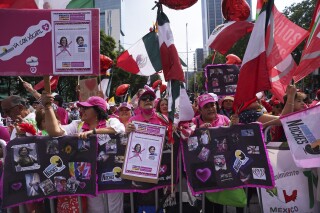Mexico is likely to elect its first woman president as the country faces a regional migration crisis

Supporters of Senator Xóchitl Gálvez, opposition candidate in the presidential elections, cheer during a political event at the Angel of Independence monument, in Mexico City, September 3, 2023. (AP Photo/Marco Ugarte )
DATE OF ELECTION
June 2
TYPE OF ELECTION
Presidential, congressional
WHO’S RUNNING
For the first time in history, two women are the top competitors for the helm of Mexico’s government. Former Mexico City mayor Claudia Sheinbaum has maintained a firm lead in polls and is running under Morena, the party of current Mexican President Andrés Manuel López Obrador. She’s been boosted by support from highly popular López Obrador. But she faces competition from Xóchitl Gálvez, running under the Fuerza y Corazón por México coalition. Former senator Gálvez often highlights her humble origins, born to an Indigenous mother and a working-class family. In a distant third place, it’s Jorge Álvarez Máynez, a youthful, little-known congressman nominated by the small Citizen’s Movement party.
WHY IT MATTERS TO THE WORLD
Not only is Mexico’s election historic in terms of gender, it will also pave the path forward for López Obrador’s party, Morena. When the populist leader was elected in 2018, it effectively cast out Mexico’s ruling party that had wielded power for decades. Any new leader elected in Mexico, one of the most powerful countries in the Americas, will have a decisive hand in sculpting geopolitics, a complicated relationship with the United States, a response to a regional migratory crisis and more.
For more on Mexico’s election, click here
To see how other 2024 elections could affect the world, click here
